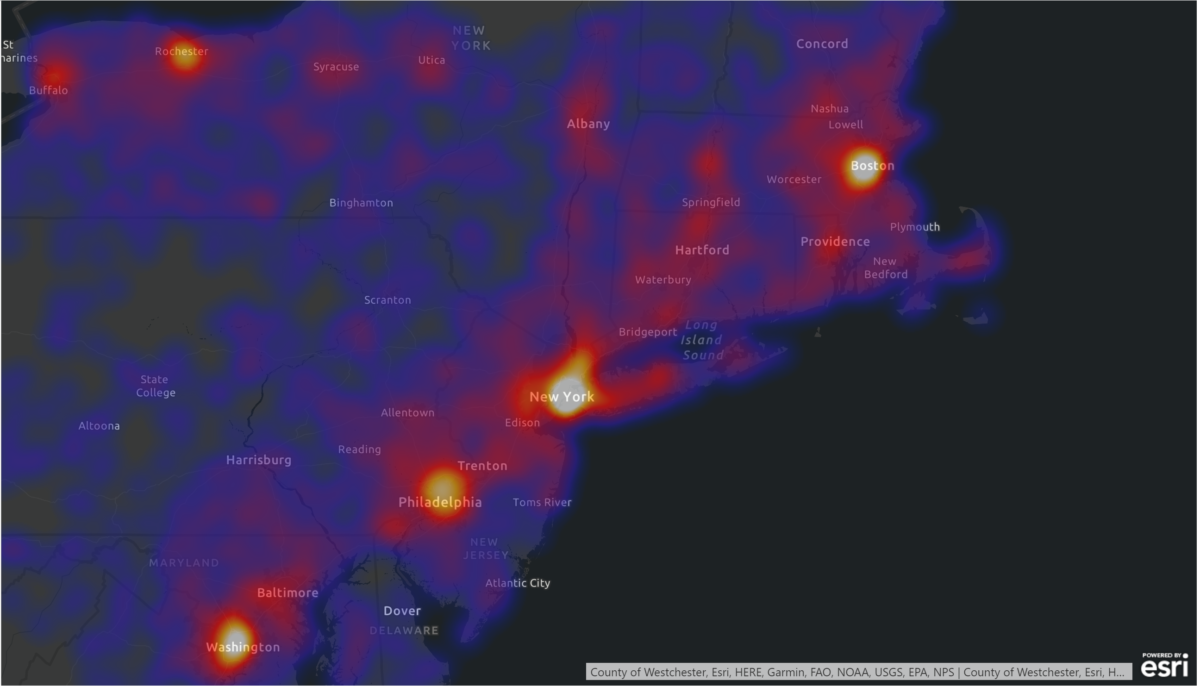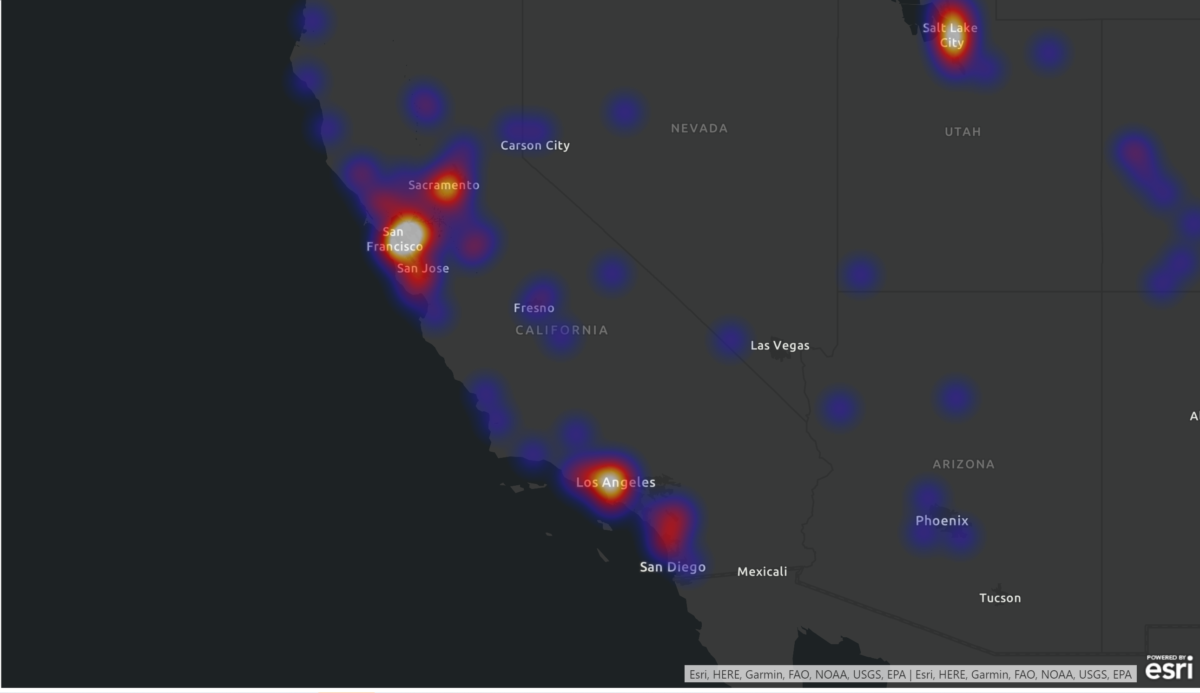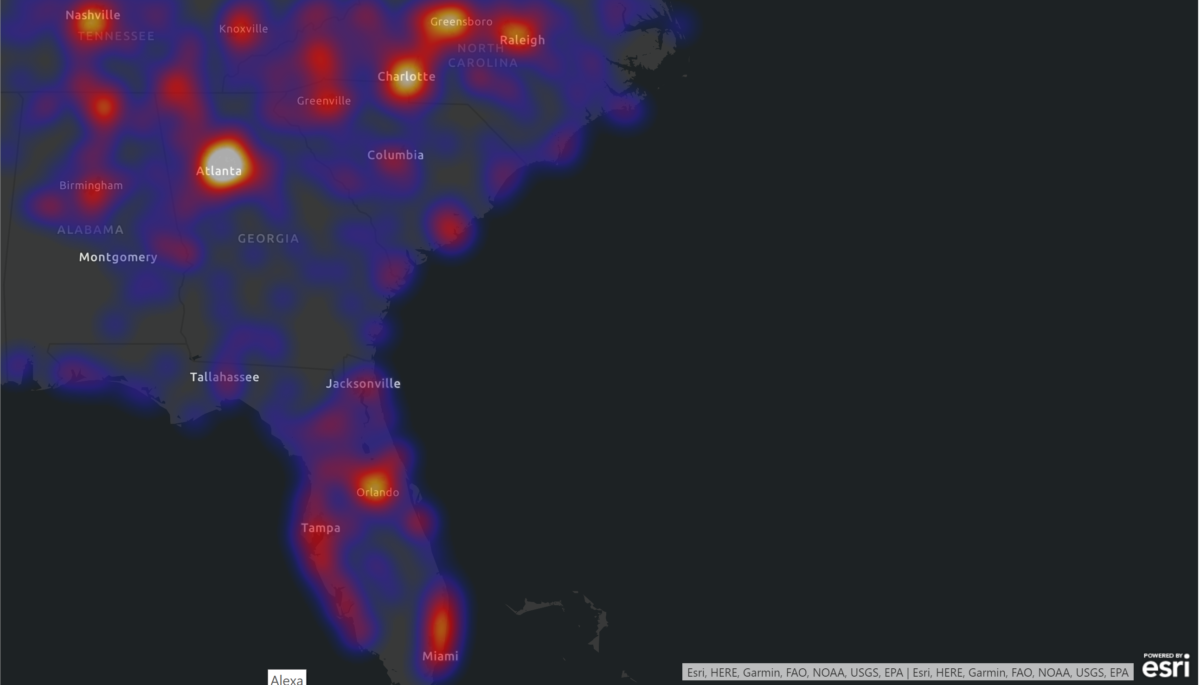Vegetable Seeds Are the New Toilet Paper
Seeds have been flying off the “shelves” of online stores.
Vegetable Seeds Are the New Toilet Paper
Seeds have been flying off the “shelves” of online stores.

A heat map shows where Harris Seeds experienced a spike in sales in the northeast region from March 16 through to April 2.courtesy of Harris Seeds
Got seeds?
Seed sellers across North America have been overwhelmed by skyrocketing demand in recent weeks as home gardeners are preparing to grow their own vegetables in the face of the COVID-19 pandemic.
Starting around March 16, online seed stores saw a huge spike in orders for vegetable seeds, as fears emerged that the pandemic could threaten food security.
The increase in demand was so dramatic for Wayne Gale and his Canada-based business, Stokes Seeds, that they temporarily closed down their online store for home gardeners, in order to ensure they could fill all of their orders for commercial growers. Gale’s business received around 1,000 orders from home gardeners during the weekend before March 16, a period of time it would usually receive around 350 such orders. “And this is not our peak season. Usually our peak season is the second week of February,” Gale says.
Sellers say that many of their new customers are likely new to the world of gardening, and are cooped up in their homes with a lot of time on their hands. While seed growers think any time is a good time to start growing your own food, they say concerns over the food supply are probably driving a lot of the current interest.
Veseys Seeds, a mail-order seed company based in the Canadian province of Prince Edward Island, processed the same number of orders by the end of March than it would have completed by June in a normal year. During that period, the company saw an average 335 percent increase over normal volume. One day last week it saw a 599 percent increase in demand.
“I think it’s a combination of factors, but it’s resulting in somewhat of a perfect storm here in little York, Prince Edward Island,” says John Barrett, the company’s director of sales, marketing and development.
The company, which prides itself on being able to turn around orders promptly, was running around 10 days behind near the end of March with around 12,000 orders.
The spike has created operational challenges for seed sellers, as keeping up with demand has been hard. Some were already short staffed, as employees were quarantined due to travel, or had to stay home with their children as schools closed. And some sellers would usually be winding down at this time of year and laying off their seasonal workers.
Seed companies have been largely unable to bring new employees into their warehouses to help with the backlogs, due to social distancing guidelines they are following. As has been the case with other industries, they have had to weigh efficiency with safety and do the best they can.

Ken Wasnock, the CEO of Harris Seeds, says that the majority of his company’s new demand has come from urban areas. The company has seen high volumes of sales to neighborhoods in New York City, where historically it hasn’t sold much seed.
Harris Seeds, which is based in New York, has experienced a 50 percent uptick in the home gardener part of its business, and like others, saw its volume of orders spike three-fold on March 16. The company also sells to commercial growers, and wholesale to other sellers.

Wasnock says earlier in the spike, a lot of the orders were coming from doomsday preppers, who purchased sprouting kits that don’t require natural light. In the weeks since, he’s seen an increase in children’s gardening products, as parents try to plan activities and projects. Wasnock says that a high percentage of seeds people are buying are organic. Some of the more popular types of vegetable seeds ordered have included squash, zucchini, tomatoes and beans.
He says that what seems to be top of mind for many new gardeners is food security. From a seed seller’s perspective, it never hurts to start growing your own food, especially while governments across the world are struggling to figure out how the necessary number of workers will be available for the coming growing season. “I think it’s always good for people to grow their own food. I think that’s something we’ve largely lost as a society over the last 30 years or so,” Wasnock says. “So I do think that it’s always wise to do that.”
Follow us

This work is licensed under a Creative Commons Attribution-NoDerivatives 4.0 International License.
Want to republish a Modern Farmer story?
We are happy for Modern Farmer stories to be shared, and encourage you to republish our articles for your audience. When doing so, we ask that you follow these guidelines:
Please credit us and our writers
For the author byline, please use “Author Name, Modern Farmer.” At the top of our stories, if on the web, please include this text and link: “This story was originally published by Modern Farmer.”
Please make sure to include a link back to either our home page or the article URL.
At the bottom of the story, please include the following text:
“Modern Farmer is a nonprofit initiative dedicated to raising awareness and catalyzing action at the intersection of food, agriculture, and society. Read more at <link>Modern Farmer</link>.”
Use our widget
We’d like to be able to track our stories, so we ask that if you republish our content, you do so using our widget (located on the left hand side of the article). The HTML code has a built-in tracker that tells us the data and domain where the story was published, as well as view counts.
Check the image requirements
It’s your responsibility to confirm you're licensed to republish images in our articles. Some images, such as those from commercial providers, don't allow their images to be republished without permission or payment. Copyright terms are generally listed in the image caption and attribution. You are welcome to omit our images or substitute with your own. Charts and interactive graphics follow the same rules.
Don’t change too much. Or, ask us first.
Articles must be republished in their entirety. It’s okay to change references to time (“today” to “yesterday”) or location (“Iowa City, IA” to “here”). But please keep everything else the same.
If you feel strongly that a more material edit needs to be made, get in touch with us at [email protected]. We’re happy to discuss it with the original author, but we must have prior approval for changes before publication.
Special cases
Extracts. You may run the first few lines or paragraphs of the article and then say: “Read the full article at Modern Farmer” with a link back to the original article.
Quotes. You may quote authors provided you include a link back to the article URL.
Translations. These require writer approval. To inquire about translation of a Modern Farmer article, contact us at [email protected]
Signed consent / copyright release forms. These are not required, provided you are following these guidelines.
Print. Articles can be republished in print under these same rules, with the exception that you do not need to include the links.
Tag us
When sharing the story on social media, please tag us using the following: - Twitter (@ModFarm) - Facebook (@ModernFarmerMedia) - Instagram (@modfarm)
Use our content respectfully
Modern Farmer is a nonprofit and as such we share our content for free and in good faith in order to reach new audiences. Respectfully,
No selling ads against our stories. It’s okay to put our stories on pages with ads.
Don’t republish our material wholesale, or automatically; you need to select stories to be republished individually.
You have no rights to sell, license, syndicate, or otherwise represent yourself as the authorized owner of our material to any third parties. This means that you cannot actively publish or submit our work for syndication to third party platforms or apps like Apple News or Google News. We understand that publishers cannot fully control when certain third parties automatically summarize or crawl content from publishers’ own sites.
Keep in touch
We want to hear from you if you love Modern Farmer content, have a collaboration idea, or anything else to share. As a nonprofit outlet, we work in service of our community and are always open to comments, feedback, and ideas. Contact us at [email protected].by Alex Robinson, Modern Farmer
April 5, 2020
Modern Farmer Weekly
Solutions Hub
Innovations, ideas and inspiration. Actionable solutions for a resilient food system.
ExploreShare With Us
We want to hear from Modern Farmer readers who have thoughtful commentary, actionable solutions, or helpful ideas to share.
SubmitNecessary cookies are absolutely essential for the website to function properly. This category only includes cookies that ensures basic functionalities and security features of the website. These cookies do not store any personal information.
Any cookies that may not be particularly necessary for the website to function and are used specifically to collect user personal data via analytics, ads, other embedded contents are termed as non-necessary cookies.
My client SandiaSeed.com has been selling out of many of their seeds, too!
If more gardens are born from this, that’s one good thing to celebrate! 🙂
Most veggies at the grocery store can be propagated from the leftover cutoff end simply put into a glass with shallow water.
No home grower seeds. What happens when the big boys can’t deliver food, and we can’t get seeds to grow at home? May want to ration some for the individual people who grow… Stay safe everyone.
I am a market gardener who learned decades ago to order seed in December or January to avoid backorders and sell-outs. I was happy to see some seed houses reserving their seed to commercial growers only, like Johnny’s Selected Seeds.
Utilize your local small Garden centers.
Been organic vegetable gardening for 20 years. I was lucky to acquire my seeds before the virus hit!